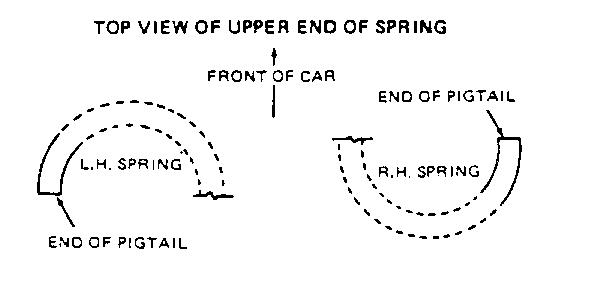REAR SUSPENSION NOISE DIAGNOSIS & PROCEDURE

VEHICLES AFFECTED: 1986 - 1989 'H' MODELS
*This bulletin has been revised to update parts information under 'straight rate spring'. Discard 89-3-117 dated 12/11/89 and replace it with 89-3-117 dated 04/30/90.
Rear suspension noise on some 1986 through 1989 "H" models can be caused by one or more of the following:
Spring Contact With Body Flange -
This conditon can be verified by visual inspection for any signs of contact between the coil spring and the body flange. If this condition exists, the following should be done.
The body flange sheet metal should be carefully repositioned to maximize clearance. Apply paint and/or rustproofing material as needed to prevent corrosion.
Inspect the coil springs for proper positon. If necessary, position the springs as shown in the illustration below, taken from the 1989 Service Manual, so that the ends of the spring pigtails are positioned outboard. Note that this orientation is different than that shown in the 1986 through 1988 Chassis service Manuals.
Top Spring coils contact each other (cars without Electronic Level Control)
This condition can occur in the variable rate design springs used on 1987-89 'H' body cars without Electronic Level Control. If this condition is suspected, it can be verified by installing insulating material (heater hose or equivalent) to the top coils and test driving. If the noise is eliminated with the insulating material, the rear coil springs should be replaced with the appropriate springs from CANSPO.
If the suspension noise is determined to be caused by the rear variable rate coil springs, and the noise cannot be eliminated by any of the above methods (including replacing the original variable rate rear coil springs with new variable rate rear coil springs), the variable rate springs may be replaced with straight rate springs (both sides must be replaced) according to the following table.
VARIABLE RATE SPRING STRAIGHT RATE SPRING -------------------- -------------------- Production Service Service Part Number Code Part Number Code Part Number ------------ ---- ----------- ---- ------------ 25525305 MAW 25530348 NYY 25523882 25525304 MAV 25530348 NYW 25523880 25526303 MAT 25530348 NYW 25523980 25525302 MAS 25530346 NYT 10035260 25525301 MAR 25530346 NYT 10035260 25525300 MAF 25530344 MBF 25526963 25525299 MAN 25530344 MBF 25526963 25530349 RRJ 25530348 NYY 25523982 25530348 RRH 25530348 NYW 25523980 25530347 RRE 25530348 NYW 25523980 25530346 RRD 25530346 NYT 10035260 25530345 RRC 25530346 NYT 10035260 25530344 RRB 25530344 MBF 25526963 25530343 RRA 25530344 MBF 25526963 25525686 MBD 25530363 NZE 25524843 25525311 MBC 25530363 NZE 25524843 25525310 MBB 25530363 NZE 25524843 25525309 MBA 25530361 NZC 25524841 25525308 MAZ 25530361 NZC 25524841 25525307 MAY 25530359 MBG 25526961 25525306 MAX 25530359 MBG 25526961 25530364 RRS 25530363 NZE 25524843 25530363 RRR 25530363 NZE 25524843 25530362 RRO 25530363 NZE 25524843 25530361 RRN 25530361 NZC 25524841 25530360 RRM 25530361 NZC 25524841 25530359 RRL 25530359 MBG 25526961 25530358 RRK 25530359 MBG 25526961


General Motors bulletins are intended for use by professional technicians, not a "do-it-yourselfer". They are written to inform those technicians of conditions that may occur on some vehicles, or to provide information that could assist in the proper service of a vehicle. Properly trained technicians have the equipment, tools, safety instructions and know-how to do a job properly and safely. If a condition is described, do not assume that the bulletin applies to your vehicle, or that your vehicle will have that condition. See a General Motors dealer servicing your brand of General Motors vehicle for information on whether your vehicle may benefit from the information.
